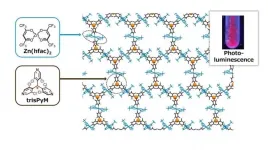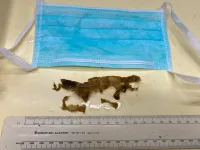(Press-News.org) Rapid deployment of artificial intelligence and machine learning to tackle coronavirus must still go through ethical checks and balances, or we risk harming already disadvantaged communities in the rush to defeat the disease.
This is according to researchers at the University of Cambridge's Leverhulme Centre for the Future of Intelligence (CFI) in two articles, published today in the British Medical Journal, cautioning against blinkered use of AI for data-gathering and medical decision-making as we fight to regain some normalcy in 2021.
"Relaxing ethical requirements in a crisis could have unintended harmful consequences that last well beyond the life of the pandemic," said Dr Stephen Cave, Director of CFI and lead author of one of the articles.
"The sudden introduction of complex and opaque AI, automating judgments once made by humans and sucking in personal information, could undermine the health of disadvantaged groups as well as long-term public trust in technology."
In a further paper, co-authored by CFI's Dr Alexa Hagerty, researchers highlight potential consequences arising from the AI now making clinical choices at scale - predicting deterioration rates of patients who might need ventilation, for example - if it does so based on biased data.
Datasets used to "train" and refine machine-learning algorithms are inevitably skewed against groups that access health services less frequently, such as minority ethnic communities and those of "lower socioeconomic status".
"COVID-19 has already had a disproportionate impact on vulnerable communities. We know these systems can discriminate, and any algorithmic bias in treating the disease could land a further brutal punch," Hagerty said.
In December, protests ensued when Stanford Medical Centre's algorithm prioritized home-workers for vaccination over those on the Covid wards. "Algorithms are now used at a local, national and global scale to define vaccine allocation. In many cases, AI plays a central role in determining who is best placed to survive the pandemic," said Hagerty.
"In a health crisis of this magnitude, the stakes for fairness and equity are extremely high."
Along with colleagues, Hagerty highlights the well-established "discrimination creep" found in AI that uses "natural language processing" technology to pick up symptom profiles from medical records - reflecting and exacerbating biases against minorities already in the case notes.
They point out that some hospitals already use these technologies to extract diagnostic information from a range of records, and some are now using this AI to identify symptoms of COVID-19 infection.
Similarly, the use of track-and-trace apps creates the potential for biased datasets. The researchers write that, in the UK, over 20% of those aged over 15 lack essential digital skills, and up to 10% of some population "sub-groups" don't own smartphones.
"Whether originating from medical records or everyday technologies, biased datasets applied in a one-size-fits-all manner to tackle COVID-19 could prove harmful for those already disadvantaged," said Hagerty.
In the BMJ articles, the researchers point to examples such as the fact that a lack of data on skin colour makes it almost impossible for AI models to produce accurate large-scale computation of blood-oxygen levels. Or how an algorithmic tool used by the US prison system to calibrate reoffending - and proven to be racially biased - has been repurposed to manage its COVID-19 infection risk.
The Leverhulme Centre for the Future of Intelligence recently launched the UK's first Master's course for ethics in AI. For Cave and colleagues, machine learning in the Covid era should be viewed through the prism of biomedical ethics - in particular the "four pillars".
The first is beneficence. "Use of AI is intended to save lives, but that should not be used as a blanket justification to set otherwise unwelcome precedents, such as widespread use of facial recognition software," said Cave.
In India, biometric identity programs can be linked to vaccination distribution, raising concerns for data privacy and security. Other vaccine allocation algorithms, including some used by the COVAX alliance, are driven by privately owned AI, says Hagerty. "Proprietary algorithms make it hard to look into the 'black box', and see how they determine vaccine priorities."
The second is 'non-maleficence', or avoiding needless harm. A system programmed solely to preserve life will not consider rates of 'long covid', for example. Thirdly, human autonomy must be part of the calculation. Professionals need to trust technologies, and designers should consider how systems affect human behaviour - from personal precautions to treatment decisions.
Finally, data-driven AI must be underpinned by ideals of social justice. "We need to involve diverse communities, and consult a range of experts, from engineers to frontline medical teams. We must be open about the values and trade-offs inherent in these systems," said Cave.
"AI has the potential to help us solve global problems, and the pandemic is unquestionably a major one. But relying on powerful AI in this time of crisis brings ethical challenges that must be considered to secure public trust."
INFORMATION:
Coordination polymers (CPs) composed of organic radicals have been the focus of much research attention in recent years due to their potential application to a wide variety of next-generation electronics, from more flexible devices to 'spintronics' storage of information. Sadly, they often suffer from their limited stability and poor crystallinity. Researchers from Japan's Institute for Molecular Science (IMS), National Institute of Natural Sciences (NINS) have developed a novel recipe that not only produces a stable material, but offers a variety of other useful attributes.
Their findings appear in the journal ...
The 2020 COVID-19 pandemic is creating a viral archive, an archaeological record of history in the making. One aspect of this archive is increased environmental pollution, not least through discarded face-masks and gloves, collectively known as PPE, that characterise the pandemic.
These items of plastic waste have become symbolic of the pandemic and have now entered the archaeological record, in particular face-masks.
In the UK alone, 748 million items of PPE, amounting to 14 million items a day, were delivered to hospitals in the two or so months from ...
Researchers believe they may have discovered a possible cause of a mystery condition that can leave sufferers suddenly unable to walk, talk or see.
It's hoped the study - led by the University of York and Hull York Medical School and supported by Tees, Esk and Wear Valley NHS Trust - will pave the way for new treatments for Conversion disorder which affects around 800,000 people in the UK alone.
The condition, also known as functional neurological disorder (FND), causes physical symptoms that would appear neurological but doctors can't find an injury or physical condition to explain them.
Professor Christina van der Feltz-Cornelis from the Department of Health Sciences is leading the Conversion And Neuro-inflammation ...
Two-thirds of 1,120 healthcare workers surveyed worldwide would separate mothers and babies with a positive or unknown COVID-19 status.
Implementing Kangaroo Mother Care and keeping mothers and babies together could save more than 125,000 newborn lives, representing 65x decreased risk of newborn death compared to the risk of newborn deaths from COVID-19.
New research underscores the need for decision-makers and providers, particularly in LMICs, to protect and strengthen care for small and sick newborns during the pandemic.
The COVID-19 pandemic is affecting the quality of care given to small and sick newborn babies in all regions of the world and threatening implementation of life-saving interventions, ...
Below please find summaries of new articles that will be published in the next issue of Annals of Internal Medicine. The summaries are not intended to substitute for the full articles as a source of information. This information is under strict embargo and by taking it into possession, media representatives are committing to the terms of the embargo not only on their own behalf, but also on behalf of the organization they represent.
1. Switching from TDF- to TAF-containing ART associated with the development of obesity in people living with HIV
Abstract: https://www.acpjournals.org/doi/10.7326/M20-4853
URL goes live when the embargo lifts
Switching from antiretroviral therapy ...
In Switzerland about 17 000 people are living with an HIV infection, worldwide there are about 38 million. Today, the disease can be treated so successfully that a normal life can be ensured to a great extent. However, weight increases are often observed at the beginning of HIV therapy due to adaptations of the metabolism, which are part of a successful therapy. Therefore, body weight control plays an important role in HIV therapy. It is important, for example, to avoid metabolic problems that can lead to heart attacks or diabetes over the long term.
Tenofovir is the drug used as part of the standard HIV therapies. The previously, widely used TDF-based therapy (tenofovir disoproxil fumarate, TDF) has been associated with renal side effects and ...
An important Maya man buried nearly 1,300 years ago led a privileged yet difficult life. The man, a diplomat named Ajpach' Waal, suffered malnutrition or illness as a child, but as an adult he helped negotiate an alliance between two powerful dynasties that ultimately failed. The ensuing political instability left him in reduced economic circumstances, and he probably died in relative obscurity.
During excavations at El Palmar, a small plaza compound in Mexico near the borders of Belize and Guatemala, archaeologists led by Kenichiro Tsukamoto, an assistant professor of anthropology at UC Riverside, discovered a hieroglyph-adorned stairway ...
(Boston)-- Newly published National Institute of Neurological Disorders and Stroke (NINDS) Consensus Diagnostic Criteria for Traumatic Encephalopathy Syndrome (TES) are the first expert consensus criteria developed for the clinical disorder associated with Chronic Traumatic Encephalopathy (CTE) brain pathology. CTE is a degenerative brain disease associated with a history of repetitive head impacts, including those sustained in contact and collision sports such as American football and boxing. At this time, CTE can only be diagnosed after death through a neuropathological examination of brain tissue. There has been no accepted approach or agreed upon criteria for the diagnosis of CTE and its clinical manifestations during life until now.
"The publication of these criteria ...
Exercise during pregnancy may let mothers significantly reduce their children's chances of developing diabetes and other metabolic diseases later in life, new research suggests.
A study in lab mice has found that maternal exercise during pregnancy prevented the transmission of metabolic diseases from an obese parent - either mother or father - to child. If the finding holds true in humans, it will have "huge implications" for helping pregnant women ensure their children live the healthiest lives possible, the researchers report in a new scientific paper.
This means that one day soon, a woman's first trip to the doctor after conceiving might include a prescription for an exercise ...
The $1.9 trillion American Rescue Plan, a stimulus package introduced by the Biden Administration, recently received Congress' approval. The stimulus package, like its two predecessors aimed at providing relief for individuals and businesses hindered by the COVID-19 pandemic, includes another round of funding for the Paycheck Protection Program (PPP).
The American Rescue Plan includes $7.25 billion for PPP loans as well as a number of changes to make it easier for the smallest of businesses to gain access to the funding. With billions on the table for struggling small businesses, new research from the University of Florida Warrington College of ...





